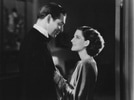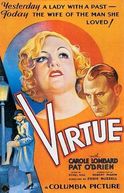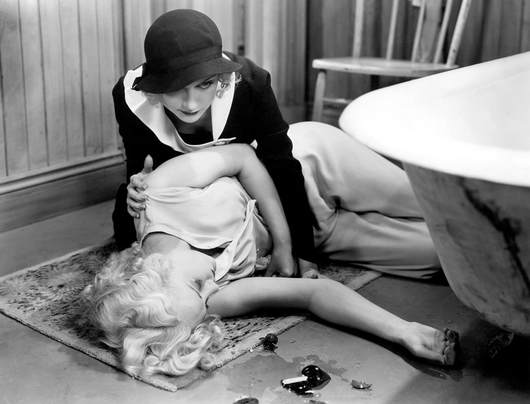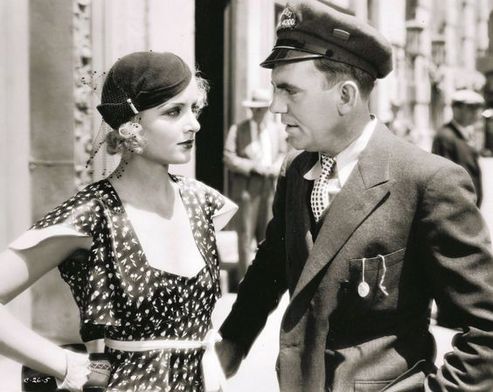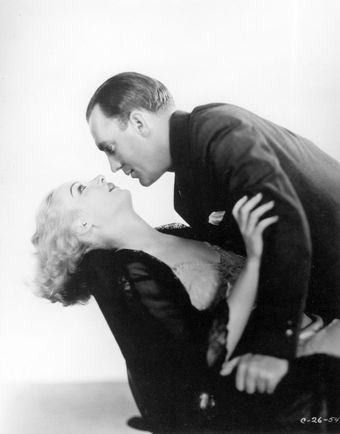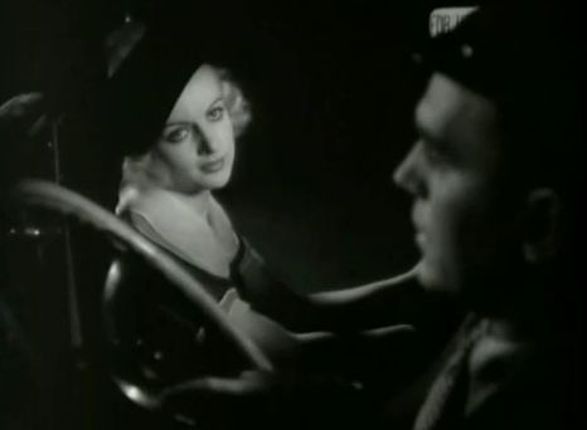Plot:
Carole Lombard plays Mae, a prostitute on the run from the law, nominally trying to turn her life around when she meets good natured cab driver Jimmy (O’Brien). The 2 fall in love, but just after being married, Mae’s past comes out, making Jimmy aware of her status with the law & her sullied past. He decides to honor his wedding vows, but remains suspicious of Mae as he tries to save to buy a half interest in a gas station. When Mae’s friend Gert runs a scan on her, duping Mae out of $200 of Jimmy’s gas station, then turns up dead, Mae is arrested. Jimmy, assuming Mae is mixed up in murder as a result of returning to prostitution, initially disavows Mae & his marriage, leaving her to fend for herself & the mounting evidence against her. Finally, Jimmy realizes that he loves Mae and helps unmask the real killer, gets the money back and buys into the gas station of his dream with Mae at his side.
Carole Lombard plays Mae, a prostitute on the run from the law, nominally trying to turn her life around when she meets good natured cab driver Jimmy (O’Brien). The 2 fall in love, but just after being married, Mae’s past comes out, making Jimmy aware of her status with the law & her sullied past. He decides to honor his wedding vows, but remains suspicious of Mae as he tries to save to buy a half interest in a gas station. When Mae’s friend Gert runs a scan on her, duping Mae out of $200 of Jimmy’s gas station, then turns up dead, Mae is arrested. Jimmy, assuming Mae is mixed up in murder as a result of returning to prostitution, initially disavows Mae & his marriage, leaving her to fend for herself & the mounting evidence against her. Finally, Jimmy realizes that he loves Mae and helps unmask the real killer, gets the money back and buys into the gas station of his dream with Mae at his side.
Thoughts: For someone who has enjoyed Carole Lombard’s screwball comedies, Virtue is a radical departure in tone, substance & style. Gone is the daffy blonde who ‘cutes’ her way to happiness. Gone too is the sing song voice that climbs to higher octaves as the zaniness around her mounts. Finally, gone is the carefree attitude in so many of her screwball characters like Connie Randall (No Man of Her Own) & Irene Bullock (My Man Godfrey). Replacing all these characteristics is a hardened woman, somehow reduced to prostitution, tough through and through. Her voice is deep, with a Brooklyn accent, & her speech is harsh and cold. The fact that Lombard made Virtue on loan out to Columbia cannot be understated in all of the elements noted above. She had yet to establish her credibility as a comedienne, so Paramount had no trouble loaning her out to the Poverty Row studio where she could get top billing in the hopes of raising her star profile. Columbia’s M.O. was cheap and quick and at times those production values are evident, but Lombard is convincing as the street wise prostitute and the story hums along at a pretty good clip.
When Lombard confronts Gert in an attempt to get the money back, she appears in a doorway reflected in a mirror. Her stern, menacing look strikes fear in Gert and immediately reshapes the women’s relationship, which previously had favored Gert to the extent that she was able to dupe Mae. When she slaps Gert later in the scene Gert’s fear is obvious & Lombard’s anger is wonderfully shown, which is a revelation as a serious actress.
Virtue is a solid, if unspectacular example of Pre-Code style moviemaking. The lower rungs of society represented by prostitution on one side & the blue collar, taxi driving Jimmy on the other are typical of the period. O’Brien’s performance is natural and also foreshadows later working class parts he would play. It is Lombard’s movie, however, and she shines in the dramatic role. Had she not been so successful just 2 years later with Twentieth Century is would have been interesting to see if audiences would have accepted her as a serious actress. Then again, filmdom could quite possibly have lost one of the greatest comediennes if she had stuck to drama.
When Lombard confronts Gert in an attempt to get the money back, she appears in a doorway reflected in a mirror. Her stern, menacing look strikes fear in Gert and immediately reshapes the women’s relationship, which previously had favored Gert to the extent that she was able to dupe Mae. When she slaps Gert later in the scene Gert’s fear is obvious & Lombard’s anger is wonderfully shown, which is a revelation as a serious actress.
Virtue is a solid, if unspectacular example of Pre-Code style moviemaking. The lower rungs of society represented by prostitution on one side & the blue collar, taxi driving Jimmy on the other are typical of the period. O’Brien’s performance is natural and also foreshadows later working class parts he would play. It is Lombard’s movie, however, and she shines in the dramatic role. Had she not been so successful just 2 years later with Twentieth Century is would have been interesting to see if audiences would have accepted her as a serious actress. Then again, filmdom could quite possibly have lost one of the greatest comediennes if she had stuck to drama.
Category: Pre-Code
See Also: Possessed, Easiest Way, Midnight Mary, Three on a Match
Random Notes & Quotes:
*The opening scene of the judge reprimanding & sentencing the group of prostitutes was deliberately blacked out by censors, so that only the audio is heard. This was done to mask the smirking & laughing prostitutes, which was seen as not sufficiently punishing the profession.
*Upon meeting Columbia Pictures chief Harry Cohn for the first time, Lombard was met with “Your hair’s too white…you look like a whore.” Without thinking she snapped back “I’m sure you know what a whore looks like if anyone does”, which put the foul mouthed executive on his heels, but cemented their friendship. Later, he made a pass at Lombard, who responded “Look, Mr. Cohn, I’ve agreed to be in your shitty little picture, but fucking you is no part of the deal.” (recounted from Screwball: The Life of Carole Lombard by Larry Swindell, p. 119)
*Lombard debuted a new hairstyle in Virtue called the Olympic Bob, named in honor of the 1932 Olympic Games taking place in Los Angeles. The cut softened her hairline and added a tuft of curls.
*Lombard was a talented athlete & highly competitve, particularly tennis, & would take on all comers, preferring to play better players in the hopes of beating them. She befriended and often played with professional tennis player Eleanor Tennant.
* Jack LaRue (Toots), plays a role which foreshadows his archetypal villain in 1933’s The Story of Temple Drake. Similar in appearance, demeanor & performance his Trigger in Temple Drake is evil incarnate, while Toots seems more like a lazier version of the same man. LaRue’s dark looks, deep set eyes & thick eyebrows made him the perfect villain here and in other films.
*Renowned director Howard Hawks, referring to Lombard after working with her on Twentieth Century said she was “crazy as a bed bug.”
See Also: Possessed, Easiest Way, Midnight Mary, Three on a Match
Random Notes & Quotes:
*The opening scene of the judge reprimanding & sentencing the group of prostitutes was deliberately blacked out by censors, so that only the audio is heard. This was done to mask the smirking & laughing prostitutes, which was seen as not sufficiently punishing the profession.
*Upon meeting Columbia Pictures chief Harry Cohn for the first time, Lombard was met with “Your hair’s too white…you look like a whore.” Without thinking she snapped back “I’m sure you know what a whore looks like if anyone does”, which put the foul mouthed executive on his heels, but cemented their friendship. Later, he made a pass at Lombard, who responded “Look, Mr. Cohn, I’ve agreed to be in your shitty little picture, but fucking you is no part of the deal.” (recounted from Screwball: The Life of Carole Lombard by Larry Swindell, p. 119)
*Lombard debuted a new hairstyle in Virtue called the Olympic Bob, named in honor of the 1932 Olympic Games taking place in Los Angeles. The cut softened her hairline and added a tuft of curls.
*Lombard was a talented athlete & highly competitve, particularly tennis, & would take on all comers, preferring to play better players in the hopes of beating them. She befriended and often played with professional tennis player Eleanor Tennant.
* Jack LaRue (Toots), plays a role which foreshadows his archetypal villain in 1933’s The Story of Temple Drake. Similar in appearance, demeanor & performance his Trigger in Temple Drake is evil incarnate, while Toots seems more like a lazier version of the same man. LaRue’s dark looks, deep set eyes & thick eyebrows made him the perfect villain here and in other films.
*Renowned director Howard Hawks, referring to Lombard after working with her on Twentieth Century said she was “crazy as a bed bug.”
